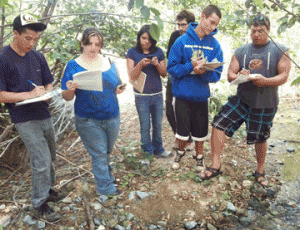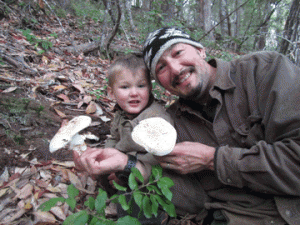 The Karuk-UC Berkeley Collaborative builds connections between tribal members and the UC Berkeley community to enhance the eco-cultural revitalization of the people and landscapes within Karuk ancestral lands and territories.
The Karuk-UC Berkeley Collaborative builds connections between tribal members and the UC Berkeley community to enhance the eco-cultural revitalization of the people and landscapes within Karuk ancestral lands and territories.
Founded in 2008 by Ron Reed, Jennifer Sowerwine and Tom Carlson, the Collaborative promotes networking opportunities between tribe members, the scientific community and other partners to support youth education, tribal health, ethnobiology, fire and riparian ecology, land use and cultural resource management, environmental justice, food security and food sovereignty, and sustainable economic development.
Karuk Tribe Goals for Eco-cultural Revitalization
Health Revitalization: Improve the health and well-being of the community through preventative and treatment measures. Key diseases targeted are diabetes, alcoholism and drug abuse. Key issues targeted are Intergenerational Historic Trauma and limited access to healthy and culturally appropriate foods and fibers.
Upslope Landscape Revitalization: Reintroduce prescribed burns into the landscape to revive cultural resources including wildlife, food, medicine, basketry and other resources.
 Youth Education and Camps: Create a venue for youth to become active participants in cultural survival processes and revitalization of cultural resource management through a series of four-season camps, integration of Karuk cultural values and Traditional Ecological Knowledge into the school curriculum, and implementation of culturally appropriate activities and lessons into after-school programs.
Youth Education and Camps: Create a venue for youth to become active participants in cultural survival processes and revitalization of cultural resource management through a series of four-season camps, integration of Karuk cultural values and Traditional Ecological Knowledge into the school curriculum, and implementation of culturally appropriate activities and lessons into after-school programs.
Ethno-scientific Links: Collaborate with research scientists to manage cultural resources utilizing both ‘western’ and traditional scientific methods.
Clearinghouse for Klamath Basin Restoration Initiatives: Create and manage a publically accessible database library to track Klamath watershed and foodshed restoration initiatives.
Riparian Habitat & Aquatic Wildlife Restoration: Create a comprehensive framework to manage and monitor restoration activities on the Klamath River and tributaries.
Economic Development: Promote industries that are environmentally compatible and that build capacity for self-reliance within mid Klamath communities.
Legal Collaborative: Identify the best legal advisors to support Karuk Tribal initiatives to regain rights to their lands, waters and cultural resources.
Build Political & Social Capital: Achieve regulatory agency buy-in of the described initiatives, particularly related to negotiating legal access to fisheries, lands and cultural resources.